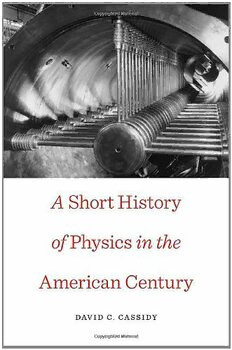Download A Short History of Physics in the American Century PDF Free - Full Version
Download A Short History of Physics in the American Century by David C. Cassidy in PDF format completely FREE. No registration required, no payment needed. Get instant access to this valuable resource on PDFdrive.to!
About A Short History of Physics in the American Century
As the twentieth century drew to a close, computers, the Internet, and nanotechnology were central to modern American life. Yet the advances in physics underlying these applications are poorly understood and widely underappreciated by U.S. citizens today. In this concise overview, David C. Cassidy sharpens our perspective on modern physics by viewing this foundational science through the lens of America’s engagement with the political events of a tumultuous century.American physics first stirred in the 1890s—around the time x-rays and radioactivity were discovered in Germany—with the founding of graduate schools on the German model. Yet American research lagged behind the great European laboratories until highly effective domestic policies, together with the exodus of physicists from fascist countries, brought the nation into the first ranks of world research in the 1930s. The creation of the atomic bomb and radar during World War II ensured lavish government support for particle physics, along with computation, solid-state physics, and military communication. These advances facilitated space exploration and led to the global expansion of the Internet.Well into the 1960s, physicists bolstered the United States’ international status, and the nation repaid the favor through massive outlays of federal, military, and philanthropic funding. But gradually America relinquished its postwar commitment to scientific leadership, and the nation found itself struggling to maintain a competitive edge in science education and research. Today, American physicists, relying primarily on industrial funding, must compete with smaller, scrappier nations intent on writing their own brief history of physics in the twenty-first century.
Detailed Information
| Author: | David C. Cassidy |
|---|---|
| Publication Year: | 2011 |
| ISBN: | 9780674049369 |
| Pages: | 220 |
| Language: | English |
| File Size: | 1.062 |
| Format: | |
| Price: | FREE |
Safe & Secure Download - No registration required
Why Choose PDFdrive for Your Free A Short History of Physics in the American Century Download?
- 100% Free: No hidden fees or subscriptions required for one book every day.
- No Registration: Immediate access is available without creating accounts for one book every day.
- Safe and Secure: Clean downloads without malware or viruses
- Multiple Formats: PDF, MOBI, Mpub,... optimized for all devices
- Educational Resource: Supporting knowledge sharing and learning
Frequently Asked Questions
Is it really free to download A Short History of Physics in the American Century PDF?
Yes, on https://PDFdrive.to you can download A Short History of Physics in the American Century by David C. Cassidy completely free. We don't require any payment, subscription, or registration to access this PDF file. For 3 books every day.
How can I read A Short History of Physics in the American Century on my mobile device?
After downloading A Short History of Physics in the American Century PDF, you can open it with any PDF reader app on your phone or tablet. We recommend using Adobe Acrobat Reader, Apple Books, or Google Play Books for the best reading experience.
Is this the full version of A Short History of Physics in the American Century?
Yes, this is the complete PDF version of A Short History of Physics in the American Century by David C. Cassidy. You will be able to read the entire content as in the printed version without missing any pages.
Is it legal to download A Short History of Physics in the American Century PDF for free?
https://PDFdrive.to provides links to free educational resources available online. We do not store any files on our servers. Please be aware of copyright laws in your country before downloading.
The materials shared are intended for research, educational, and personal use in accordance with fair use principles.

